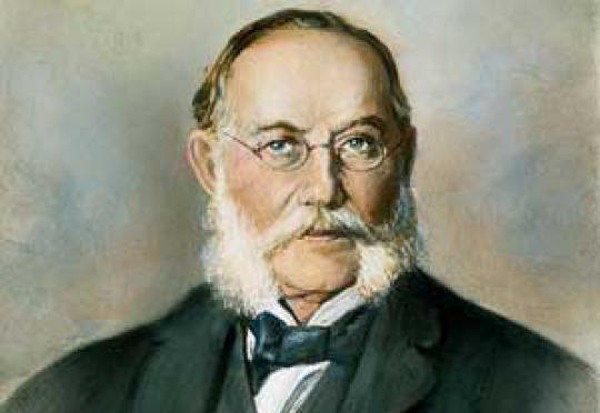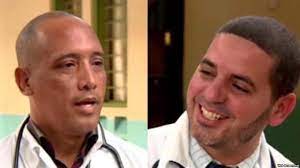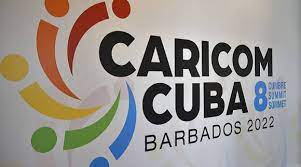 Carlos J. Finlay
Carlos J. Finlay
Kidnapped doctors: Any news? (+Español)
The statue of Carlos J. Finlay, the Cuban doctor and scientist who discovered the transmitting agent of yellow fever, was unveiled on Dec. 3. On that day we celebrate Latin American Medicine with hugs and congratulations to the men and women who assist us in any ailment. I embraced those who have always taken care of me as if they were my “family doctors,” as our grandparents called those who assisted them for years and years.
 I also congratulated those who work at the Family Clinic, a pillar of the Cuban health system, a couple of blocks from my house, and upon leaving there I remembered the two compatriot doctors kidnapped in Kenya: Landy Rodríguez Hernández (surgeon) and Assel Herrera Correa (comprehensive general practitioner). Both were kidnapped in April 2019 in the city of Mandera, on the border with Somalia, by Somali jihadists. They have been kidnapped for three years: What has happened to them?
I also congratulated those who work at the Family Clinic, a pillar of the Cuban health system, a couple of blocks from my house, and upon leaving there I remembered the two compatriot doctors kidnapped in Kenya: Landy Rodríguez Hernández (surgeon) and Assel Herrera Correa (comprehensive general practitioner). Both were kidnapped in April 2019 in the city of Mandera, on the border with Somalia, by Somali jihadists. They have been kidnapped for three years: What has happened to them?
The last mention came via tweet from President Miguel Díaz-Canel Bermúdez last September the doctors on their birthdays. In the tweet, he reiterated to continue the efforts to rescue them, a difficult and complicated task. Jihadists are not easy. But has there been any news to date? Is there evidence of life?
Hopefully it’s my fault for not searching well, but I haven’t found a mention of them in the official media on the day we celebrate all those in their profession. For both of them my best wishes for health and a speedy return.
CARICOM-CUBA Summit: …?![]()
A few days after returning from his tour of Europe and Asia, the Cuban president will tour again. Now it is the eastern Caribbean, that rosary of small and friendly islands that are close neighbors and the VIII CARICOM-CUBA Summit (Caribbean Community) is held in Barbados, made up of 14 countries. Four of these countries established diplomatic relations with Cuba in 1972: Jamaica, Barbados, Trinidad-Tobago and Guyana, later the list grew. The curious thing is how some of these islands, which fit in a thimble, had the courage to start relations with the Greater Antilles despite strong pressure to prevent it.
Cuba maintains magnificent relations with this Community, but does not participate in their economic integration. Why?
About twenty years ago I asked a friend who knew the subject, I will summarize the explanation he gave me then, which is valid until today: “Caricom’s economic model differs substantially from ours, centralized.” However, we maintain commercial and collaborative and exchange relationships in different areas and, apparently, power is now being sought to integrate…? Havana would have to start by significantly changing the economic model, that is to say to a market economy, etc.
But there is a very important area that Havana has never neglected: its foreign policy. The members of CARICOM, who year after year vote at the UN against the U.S. blockade, are members of the body that encompasses all of us in the region, except the US and Canada: CELAC (Community of Latin American and Caribbean States), also in the OAS where it has 14 of the 34 members (important even though Cuba does not belong) and they generally participate in the Summits of the Americas. Havana’s foreign policy has been and is a defensive and promotional front, a quality that it does not neglect given the growing polarization on a global scale.
Briefly said: The two presidential tours mark economic and political interests, they should not be observed independently.
*****
Versión en Español:
Médicos secuestrados: ¿Alguna novedad?
El pasado día 3 fue develada la estatua de Carlos J. Finlay, el médico y científico cubano que descubrió al agente transmisor de la fiebre amarilla. Precisamente ese día festejamos el de la Medicina Latinoamericana con abrazos y felicitaciones a los hombres y mujeres que nos asisten ante cualquier padecimiento. Yo abracé a quienes siempre han cuidado de mí como si fuesen mis “médicos de cabecera”, como le llamaban nuestros abuelos a quienes los asistían por años y años.
También felicité a los que a un par de cuadras de mi casa trabajan en el Consultorio de la Familia, pilar del sistema de salud cubano, y al salir de allí recordé a los dos compatriotas médicos secuestrados en Kenia: Landy Rodríguez Hernández (cirujano) y Assel Herrera Correa (médico general integral). Ambos fueron secuestrados en abril de 2019 en la ciudad de Mandera, fronteriza con Somalia, por yihadistas somalíes. Llevan tres años de secuestro: ¿Qué ha sido de ellos?
La última mención provino de un tweet del presidente Miguel Díaz-Canel Bermúdez en septiembre pasado a propósito de los cumpleaños de los médicos. En el tweet reiteró continuar en los esfuerzos por rescatarlos, tarea difícil y complicada, los yihadistas no son fáciles. Pero hasta la fecha de hoy: ¿alguna novedad?, ¿hay constancia de vida?
Ojalá sea “pifia” mía por no buscar bien, pero no he encontrado en los medios oficiales una mención a ellos en el día que celebramos a todos los de su profesión. Para ellos dos mis mejores deseos de salud y de pronto retorno. (Foto Foto Assel y Landy junto a una paciente en Kenya. Autor: The Star Publicado: 13/04/2019)
Cumbre CARICOM-CUBA: ¿…?
A pocos días de regresar de su gira por Europa y Asia, el presidente cubano nuevamente sale de gira. Ahora es el Caribe oriental, ese rosario de pequeñas y amables islas que son vecinos cercanos y en Barbados se celebra la VIII Cumbre CARICOM-CUBA (Comunidad del Caribe), integrada por 14 países. Cuatro de estos países establecieron relaciones diplomáticas con Cuba en 1972: Jamaica, Barbados, Trinidad-Tobago y Guyana, después la lista aumentó. Lo curioso es cómo algunas de estas tres islas, que caben en un dedal, tuvieron el valor de iniciar relaciones con la Mayor de las Antillas a pesar de las fuertes presiones para impedirlo.
Cuba mantiene magníficas relaciones con esta Comunidad, pero no participa de la integración económica. ¿Por qué?
Hace unos veinte años le pregunté a un amigo conocedor del tema, la explicación que me dio entonces, válida hasta hoy, la resumo: “el modelo económico del Caricom difiere sustancialmente del nuestro, centralizado”. Sin embargo, mantenemos relaciones comerciales y de colaboración e intercambio en diferentes áreas y, al parecer, ahora se pretende potencia, pero para integrarse…¿…? La Habana tendría que comenzar por cambiar significativamente el modelo económico, vale decir: economía de mercado, etc.
Pero hay un área muy importante que La Habana nunca ha descuidado: su política exterior. Los miembros del CARICOM, que año tras año votan en la ONU contra el bloqueo estadounidense, son miembros del órgano que nos engloba a todos en la región, excepto EE.UU y Canadá: la CELAC (Comunidad de Estados Latinoamericanos y Caribeños), también en la OEA donde cuenta con 14 de los 34 miembros (importante aunque Cuba no pertenezca) y generalmente participan en las Cumbres de las Américas. La política exterior de La Habana ha sido y es un frente defensivo y de promoción, cualidad que no descuida dada la polarización creciente a escala global.
Dicho brevemente: Los dos periplos presidenciales marcan intereses económicos y políticos, no deben observarse de manera independiente.


